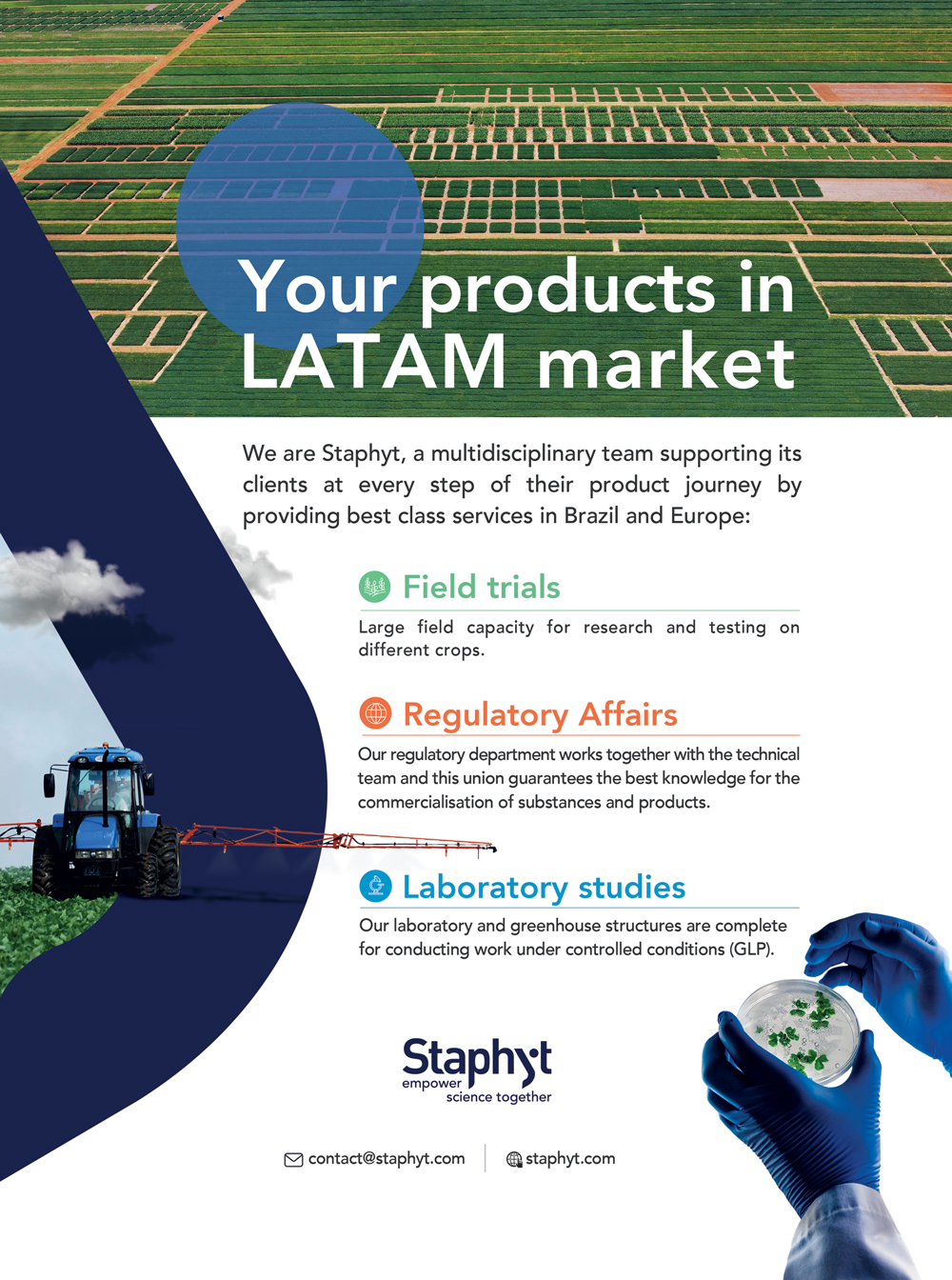Trends and Transformations in South American CRO’s for 2024

Agricultural trends in South American are reshaping contract research organizations (CROs) in 2024. As demands for efficient and reliable clinical trials continues to grow, CROs are adapting to new challenges and opportunities. AgriBusiness Global gained valuable insights from three experts on the current state and future predictions of CROs in South America.
Scroll Down to Read
![]()
By Michele Katsaris
Managing Editor
Current Updates
In South America, and specifically in Brazil, CROs have experienced several significant developments summarized in four trends. A first one is Brazil’s concern with animal welfare, which has significantly increased over the past decade, prompting the need to find alternative methods aimed at minimizing or substituting the use of vertebrate animals in laboratory activities.
Roberto Sardinha, International Sales Manager for Mérieux NutriSciences
Roberto Sardinha, International Sales Manager for Mérieux NutriSciences (Bioagri Laboratories) says, “For years, we have been seeing a global move toward more sustainable agriculture, in more synergy with the environment. Major CROs are aligned with this when they started offering alternative methodologies to animal testing for toxicological packages, as well as environmental impact studies for non-target organisms.”
A second development are changes in lab practices as multinational agrochemical companies invest in Latin American. CROs have increased capital for infrastructure development, training, and the acquisition of new technologies.
“This promotes more availability expertise of skilled labor and scientific expertise in the region, with more professionals specialized in agronomy, chemistry, and related fields. This has allowed CROs to offer a wider range of services and to conduct complex research activities,” said Alexandre Quesada, Executive Director for SmartTox. “The establishment of collaborations and partnerships between CROs, universities, and public research institutions has facilitated the exchange of knowledge and provided access to additional resources.”
A third trend is the expansion of the biopesticide market with encouragement by the Brazilian regulatory agencies by speeding up the registration process. In April 2023, Brazil released the PORTARIA CONJUNTA SDA/MAPA – IBAMA – ANVISA Nº 1, which gives CROs and biopesticides companies a better view of how to proceed in this field. Through ANVISA (National Health Surveillance Agency), MAPA (Ministry of Agriculture, Livestock, and Supply), and IBAMA (Brazilian Institute of the Environment and Renewable Natural Resources), Brazil has been updating its regulations and use of agricultural pesticides with international standards.
“Increase in the volume of studies for biopesticides products has made laboratories adapt to new demands. The interface between laboratory and biological companies allowed rapid technical evolution for the plant protection industry to adjust to a new mindset regarding study guidelines and test item handling and transport,” said Lucas Guimarães, Commercial Manager for ALS Global.
CROs have adapted to these changes to ensure compliance and expedited the process of registering new products. “As CROs, this has been a great opportunity to focus on the development and refinement of our technical team and scope of analysis aimed at working with these types of products, with the intention of keeping up with this strong market movement by offering fast and complete solutions,” said Sardinha.
A fourth trend is incorporating advanced technologies such as precision agriculture tools, satellite imaging, and data analytics to improve the efficiency and effectiveness of pesticide development and testing.
Challenges Facing CROs
CROs in the agricultural pesticides market in South America face several challenges that can impact their operations and growth. “The biggest challenges involve clients that are increasingly taking a multi-country registration strategy when planning their portfolio development, demanding a more careful planning of study guidelines to be used in each project in order to yield study reports that can be used worldwide,” said Guimarães.
Across the globe, maintaining an updated scope of services in accordance with regulatory and scientific development dynamics is difficult. It requires not only a state-of-the-art facility and equipment, but mainly a good technical team.
“A CRO needs to offer a full scope of services for regulatory ends of agriculture pesticides, biocides, households and pharmaceuticals, including physical chemistry, toxicology, ecotoxicology, environmental fate studies and others, must have a very skilled team from several different backgrounds, like chemistry, biology, agronomic engineering, pharmacy and others, and with different knowledge,” said Sardinha.
CROs are also facing challenges in recruiting and retaining a skilled workforce, including scientists, researchers, and technicians, particularly in more specialized areas of pesticide research. Attracting and retaining professionals to oversee studies and meet diverse requirements from various countries poses a significant challenge. These professionals must provide support to sponsors promptly, addressing any questions or requirements by regulatory authorities.
Lucas Guimarães, Commercial Manager for ALS Global
“Global initiatives demanding safer products for human health as well as for the environment has pressed authorities to adapt their regulatory framework, demanding continuous additions in analytical portfolios and research and development areas the frantic rhythm in which companies have to decide and evolve to cope with new technologies brought to the market every day, pushing their registration departments to tighten their project deadlines, making CROs strive to reduce time losses and optimized their operations,” said Guimarães.
Being a key agricultural nation, Brazil draws a substantial volume of products that undergo testing, with data generated for registration in both the Brazilian and global markets.
With the increasing interest in biopesticides, CROs must also possess expertise in the specific regulations governing these biological control agents, which can differ significantly from those applicable to conventional chemical pesticides. Each country maintains its own set of regulations governing the registration and approval processes for biopesticides. Navigating these intricate regulatory frameworks is crucial for CROs to assist their clients in bringing new products to market.
As regulatory policies are subject to change, CROs must stay informed about new developments and adapt their practices accordingly. This may involve reformulating products to meet updated safety standards or conducting additional studies to comply with revised regulations.
CROs frequently work with clients who market their products internationally, which means they must be familiar with international guidelines like those from the Food and Agriculture Organization (FAO), World Health Organization (WHO), and Codex Alimentarius, as well as regional harmonization efforts such as those by the European Union.
“The regulatory landscape for agricultural pesticides is complex and varies widely by jurisdiction. CROs play a critical role in ensuring that their clients not only comply with current regulations but are also prepared for future changes in the regulatory environment. This requires continuous monitoring of legal developments, investment in scientific expertise, and a proactive approach to risk management,” said Quesada.
The main regulation to comply with is the Good Laboratory Practices (GLP). In Brazil the GLP is monitored by INMETRO, which is a local organization, which follows the main principles of OECD. “In a global competition context, the is a concern regarding the harmonization of the GLP requirements and the commitment of monitoring organizations from other countries, avoiding different or more strict requirements that can bring significant barriers and higher costs to local CROs comparing to foreign competitors,” said Sardinha.
Trends for 2024
Numerous emerging trends in the CROs sector for the agricultural pesticide industry predict changes in technology, regulatory landscapes, and a broader emphasis on sustainability.
There’s a growing trend toward the development of environmentally friendly pesticides, including biopesticides and biostimulants. CROs are focusing more on these products in response to regulatory pressures and consumer demand for sustainable farming practices. This includes IPMs that includes chemical pesticides.
Alexandre Quesada, Executive Director for SmartTox
“With global regulatory environments becoming more stringent, CROs are placing a greater emphasis on ensuring that pesticide products meet all safety and efficacy guidelines. This includes adapting to changes such as the European Union’s Farm to Fork strategy, which aims to reduce the use of chemical pesticides,” said Quesada.
The utilization of big data, artificial intelligence (AI), and machine learning (ML) in the analysis of field trial data and prediction of pesticide performance is becoming increasingly more common. With these technologies, CROs are able to offer insights that can expedite the development of new pesticides and enhance the optimization of existing ones.
CROs are increasingly investing in emerging markets where agriculture plays a significant role in the economy. These regions often offer more opportunities for the development of pesticides customized to local pests and diseases.
“CROs are developing more specialized service offerings to cater to the specific needs of small and medium-sized enterprises (SMEs) as well as large corporations, offering flexibility and customization in their research services,” said Quesada. “Also, CROs are researching and supporting IPM strategies that combine biological, cultural, physical, and chemical tools in a way that minimizes economic, health, and environmental risks.
“As the agricultural sector continues to evolve,” continued Quesada. “CROs are likely to continue adapting and innovating to meet the challenges and opportunities presented by these trends in the agricultural pesticides market.” •
Join us at AgriBusiness GlobtalSM LATAM Conference on 14-15 May in Panama City, Panama, to explore new business opportunities and establish relationships with key players in the LATAM region. Register early to save and set the groundwork for generating new business and partnerships in Latin America! ABGLATAM.com



